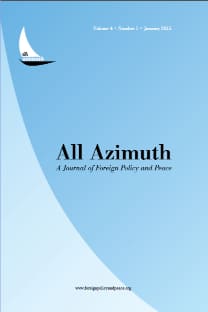Linking Status with Soft Power: Call for a Joint Research Agenda
Review article of:
Keywords:
soft power, BRICS, rising powers non-Western,
___
- Bull, Hedley, and Adam Watson. The Expansion of International Society. Oxford: Oxford University Press, 1984.
- de Almeida, Paulo Roberto, and Diaz Miguel. “Brazil’s Candidacy for Major Power Status.” In Powers and Principles: International Leadership in a Shrinking World, edited by Michael Schiffer and David Shorr, 225-56. Lanham, MD: Lexington, 2009.
- Deng, Yong, and Fei-ling Wang. China Rising: Power and Motivation in Chinese Foreign Policy. Lanham: Rowman & Littlefield, 2005.
- Feklyunina, Valentina. “Soft Power And Identity: Russia, Ukraine and the “Russian world(s).” European Journal of International Relations 22, no. 4 (2015): 1-24.
- Ferguson, Chaka. “The Strategic Use of Soft Balancing: The Normative Dimensions of the Chinese-Russian Strategic Partnership.” Journal of Strategic Studies 35, no. 2 (2012): 197-222.
- Forsberg, Tuomas. “Status Conflicts between Russia and the West: Perceptions and Emotional Biases.” Communist and Post-Communist Studies 47, no. 3 (2014): 323-31.
- Freedman, Joshua. “Status Insecurity and Temporality In World Politics.” European Journal of International Relations 22, no. 4 (2016): 797-822.
- Gill, Bates, and Yanzhong Huang. “Sources and Limits of Chinese ‘Soft Power’.” Survival 48, no. 2 (2006): 17-36.
- Green, Michael. “Why we shouldn’t judge a country by its GDP.” TED Ideas, Apr 22, 2015. Accessed April 10, 2017. http://ideas.ted.com/why-we-shouldnt-judge-a-country-by-its-gdp/.
- Hill, Fiona. “Moscow Discovers Soft Power.” Current History 105 no. 693 (2006): 341-7.
- Kahler, Miles. “Rising Powers and Global Governance: Negotiating Change in a Resilient Status Quo.” International Affairs 89, no. 3 (2013): 711-29.
- Lo, Joe Tin-yau, and Suyan Pan. “Confucius Institutes and China’s Soft Power: Practices and paradoxes.” Compare: A Journal of Comparative and International Education 46, no. 4 (2016): 512-32.
- Marlene Laurelle. “The Russian World.” International Affairs 55, no. 1 (2015): 116-22.
- Nicolaïdis, Kalypso, Richard G. Whitman, and Emilian Kavalski. “The Struggle for Recognition of Normative Powers: Normative power Europe and normative power China in context.” Cooperation and Conflict 48, no. 2 (2013): 247-67.
- Nye, Joseph. The Future of Power. New York: Public Affairs, 2011.
- Osipova, Yelena. “Russification of Soft Power: Transformation of a Concept.” Exchange: The Journal of Public Diplomacy 5, no. 1 (2014): 56-77.
- Paul, T.V., Deborah Welch Larson, and William C. Wohlforth, eds. Status in World Politics. New York: Cambridge University Press 2014..
- Popescu, Nico. “Russia’s Soft Power Ambitions.” CEPS Policy Briefs 115 (2006): 1-3.
- Stuenkel, Oliver. Post-Western World: How Emerging Powers Are Remaking Global Order. Cambridge: Polity Press 2016.
- Tafuro Ambrosetti, E. “Building a Sphere of Influence in Their Neighbourhood: The Soft Power of Turkey and Russia.” PRIMO Working Papers Series 5, January 2017, Hamburg.
- Zhang, Xiaoling, Herman Wasserman and Winston Mano, eds. China’s Media and Soft Power in Africa: Promotion and Perceptions. New York: Palgrave Macmillan US, 2016.
- ISSN: 2146-7757
- Yayın Aralığı: Yılda 2 Sayı
- Başlangıç: 2012
- Yayıncı: Dış Politika ve Barış Araştırmaları Merkezi, İhsan Doğramacı Barış Vakfı
